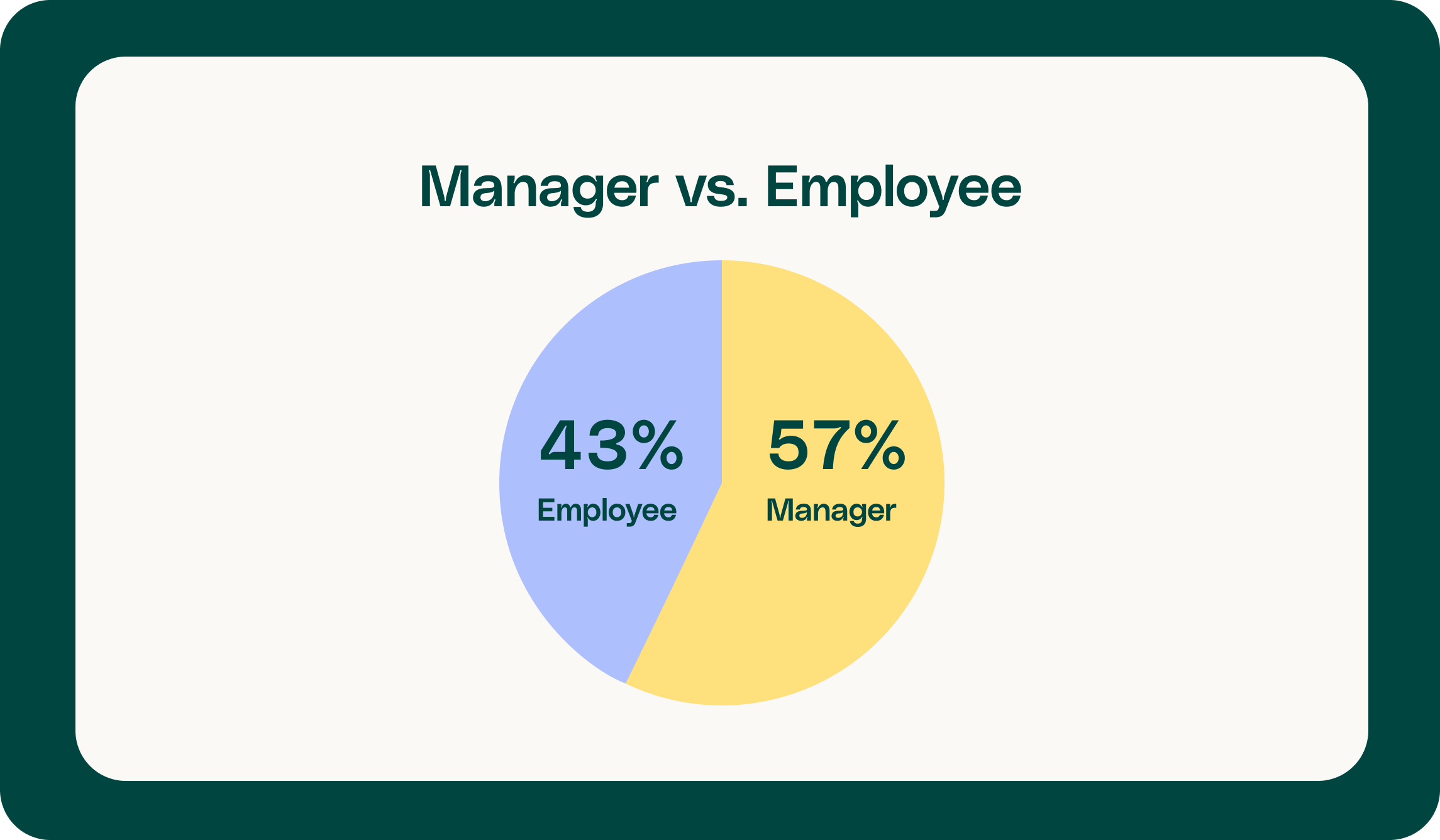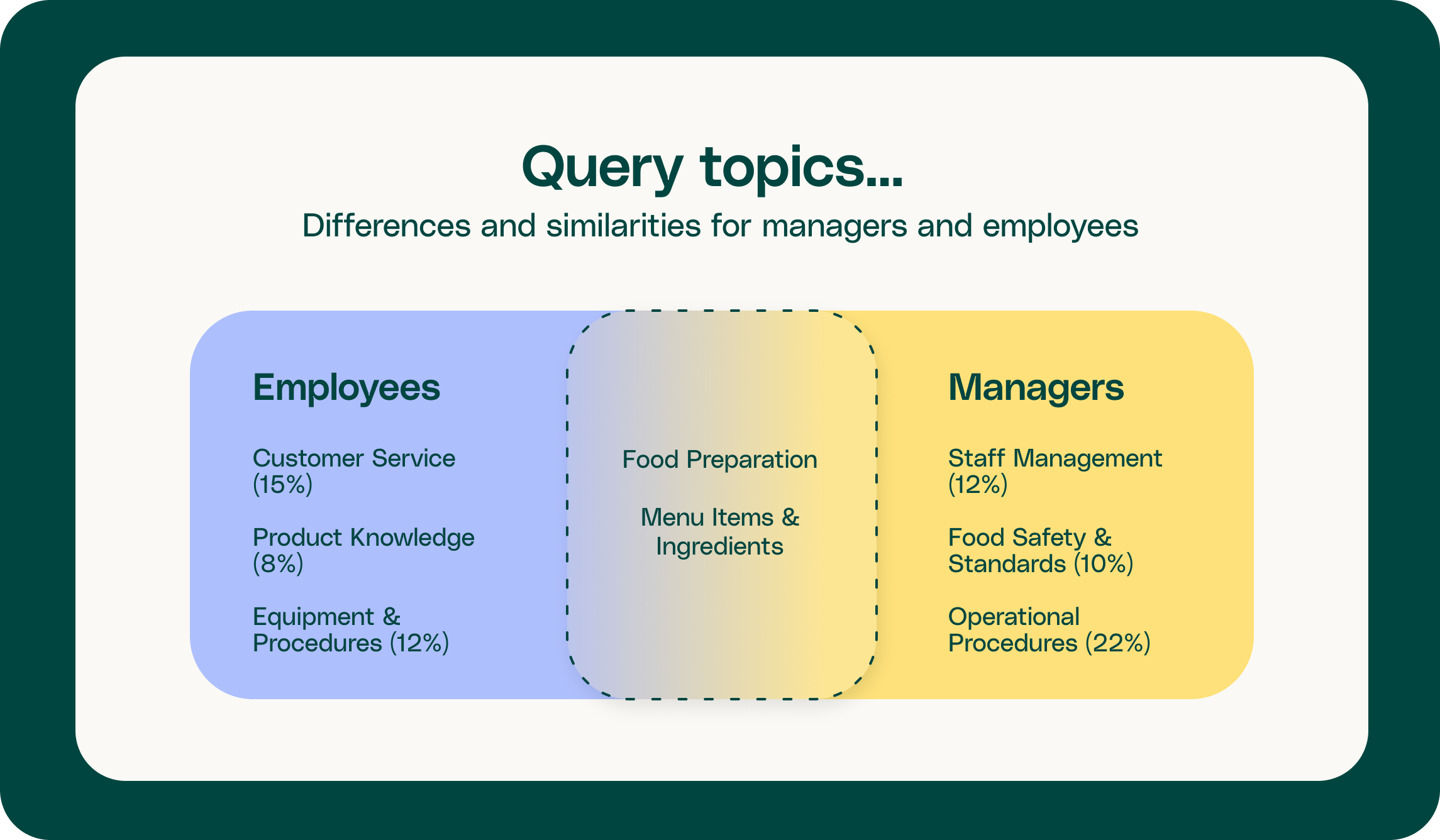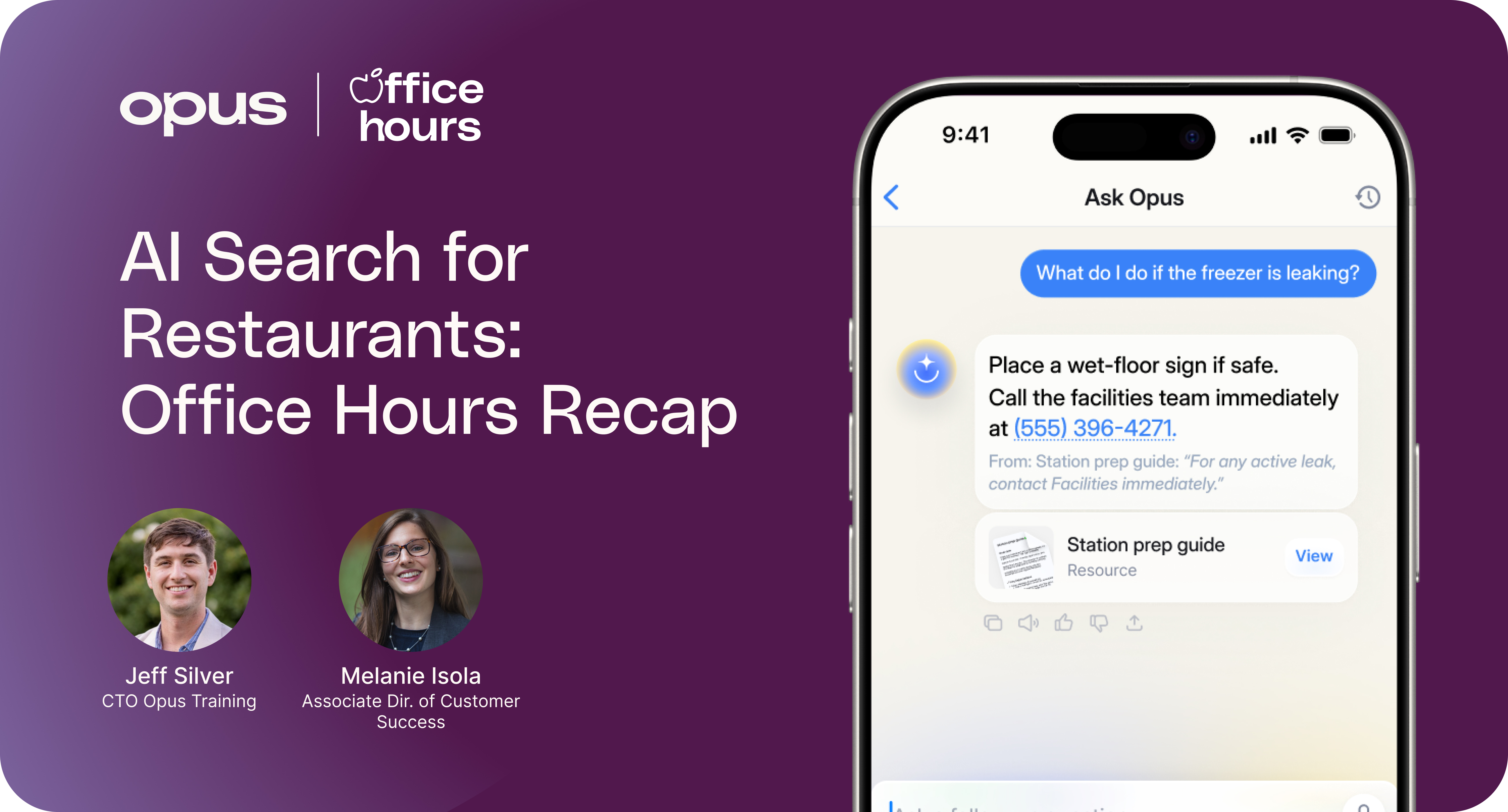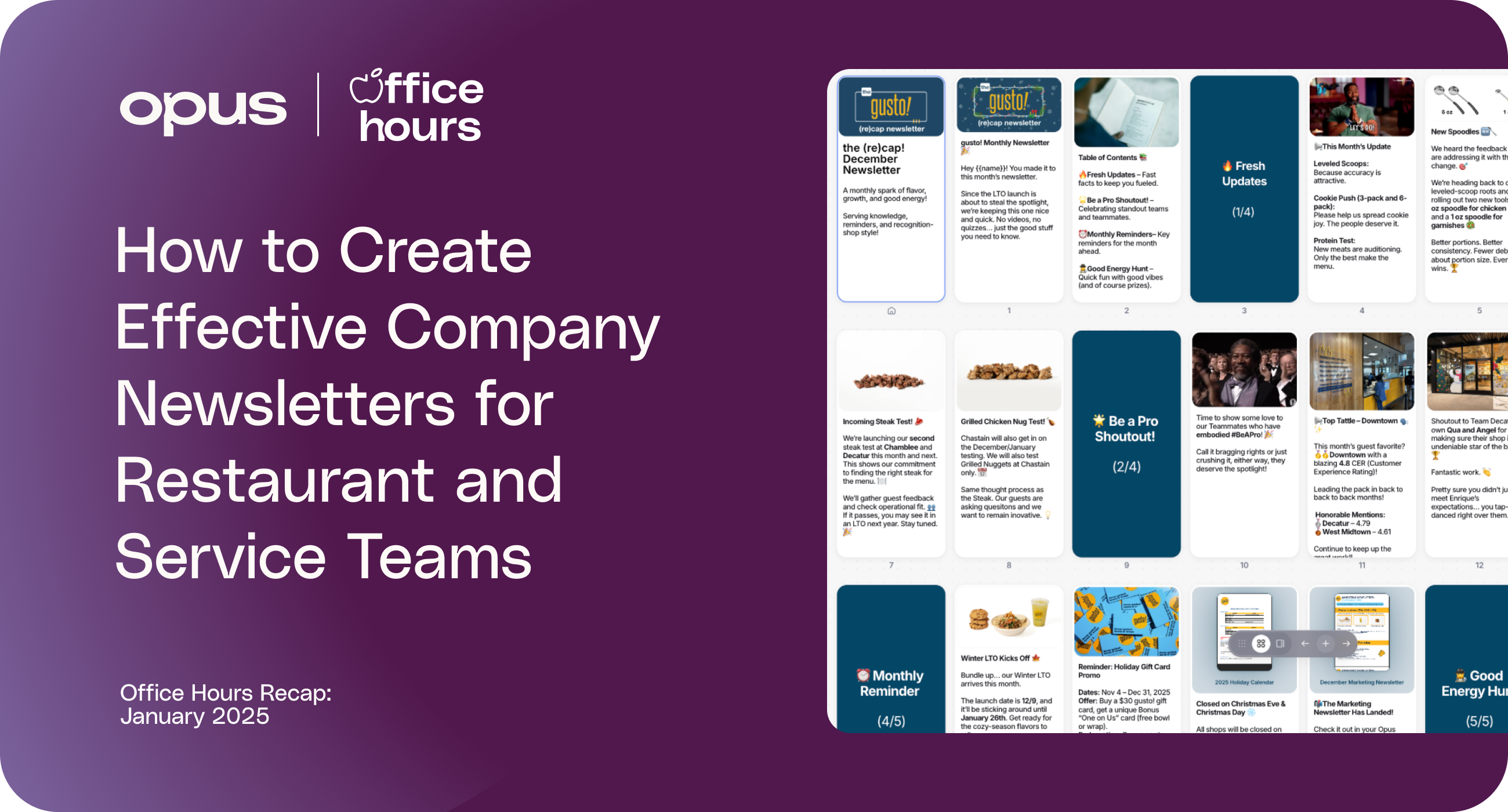When Opus launched Ask Opus—our AI-powered search tool—we started tracking how restaurant teams actually use it. The data reveals fascinating patterns that should reshape how we think about training and knowledge management.
The Reality: How AI Search Gets Used Today In Restaurants
Three key findings emerged from analyzing thousands of searches across our Opus customers:
1. Managers Use It More Than Hourly Employees
The data shows managers utilizing Ask Opus more frequently than frontline staff. "Our thesis here is that managers have a lot more information they need to keep top of mind at once," explained Jeff Silvert, Opus CTO. Managers are asking about everything from jury duty policies to equipment troubleshooting—the edge cases that don't warrant memorization but need quick answers.

2. Recipe & SOP Searches Dominate
Both managers and employees most frequently search for:
- Recipe build cards and modifications
- Standard operating procedures
- Allergen information
- Equipment-specific processes
Melanie Isola shared Gregorys Coffee as an example—they identified recipe questions as their teams' biggest pain point, with staff frequently needing to look up their various coffee recipes and seasonal menu changes.

Maximizing AI Search: Implementation Strategies
Training teams shared four proven strategies for getting the most from AI search:
Upload everything immediately - Structure doesn't matter. PDFs, videos, and existing resources all become searchable instantly. Even video subtitles are automatically extracted and indexed.
Create search-friendly content - Title resources with actual questions teams ask ("How do I process a refund?") rather than formal document names.
Leverage multilingual capabilities - Teams can search in their preferred language and receive answers in that same language, making knowledge truly accessible.
Mine search data for insights - Export question reports to identify training gaps and understand what your teams actually need to know.
💡 To learn more about the AI search capabilities for Ask Opus, visit here.
3-Step AI Search Rollout Strategy
Successful implementations follow three critical steps: focus on one pain point, communicate through multiple channels, and provide clear operational guidance.

Focus: Choose one use case that creates immediate value—complex recipe lookups for coffee shops, allergen information for full-service restaurants, or equipment troubleshooting for QSRs. Bel Air Cantina started with live demonstrations that created instant buy-in.
Communicate: Launch through multiple touchpoints including live demos, internal messaging, manager meetings, and visual aids. Build manager champions who model the behavior. Gregorys Coffee ensured success by sharing updates through resources, courses, and messages simultaneously.
Provide Guidance: Address device policies directly. Options include designated devices for search access, modified phone policies for shift leaders, or specific "knowledge check" moments when phones are permitted.
💡 For detailed implementation strategies, see our complete guide: AI Search Implementation for Service Industry Teams.
How AI Search Changes Restaurant Training Forever
The shift to AI-powered search fundamentally transforms what training teams need to focus on. Here's the paradigm shift happening in forward-thinking restaurants:
Your Knowledge Base Becomes Your Competitive Advantage
With AI search, your knowledge base isn't just documentation—it's an always-available expert that scales infinitely. Every piece of content you upload becomes instantly accessible in any language, searchable by natural questions, and available exactly when teams need it. The restaurants winning with AI search are those treating their knowledge base as a living, breathing asset rather than a static library.
Permission to Focus on What Actually Matters
"What should they be referring to? What doesn't need to be committed to memory?" Melanie challenged attendees. This question reframes everything. When teams can instantly access any procedure, recipe, or policy, training shifts from information transfer to skill development. Your prep cook doesn't need to memorize 47 sauce recipes—they need to understand flavor profiles and proper technique. Your servers don't need to recall every allergen—they need to build genuine connections with guests.
Manager Development at Scale
AI search enables a new model of manager enablement. Instead of managers being walking encyclopedias, they become coaches and leaders. When a team member asks about jury duty policy, the manager doesn't need to know—they model using Ask Opus together. This collaborative learning approach builds trust while ensuring accuracy. Managers gain back 30+ minutes per shift to invest in what only they can do: developing people, building culture, and driving the business forward.
Training Time for Human Skills
When procedural knowledge lives in AI search, training hours transform. That two-hour session on policies and procedures? Now it's a 15-minute overview of how to find answers, followed by 1 hour and 45 minutes on conflict resolution, guest recovery, or leadership development. The skills that differentiate great restaurants from good ones—empathy, problem-solving, teamwork—finally get the time they deserve.
The Bottom Line: Your Next Competitive Edge
The restaurants that will thrive in the next decade won't be those with the thickest training manuals or the most memorized procedures. They'll be the ones that recognized a fundamental truth: in an age of infinite information, the ability to access knowledge matters more than storing it in human memory.
When one attendee shared they're "using Ask Opus to learn how to use Opus," they captured the meta-beauty of this shift. Every question becomes a learning opportunity. Every search strengthens the system. Every team member becomes empowered to find answers independently.
The question isn't whether AI search will transform restaurant training—it's whether you'll lead that transformation or follow it. Start today: upload your existing materials, pick one pain point to solve, and watch as your teams discover what it means to have every answer at their fingertips.
📌 Want more great training inspiration? Join our next Office Hours on franchise operations (October 2025). See and RSVP to all upcoming events here.
Your Questions Answered: Ask Opus FAQ
Q: What happens when Ask Opus can't find an answer?
A: The system explicitly tells you no information is available. It only pulls from your uploaded content and won't make up answers or pull from external sources.
Q: Can teams use voice instead of typing?
A: Yes. The system uses your phone's speech-to-text functionality. You can speak your question and press send.
Q: Does Ask Opus respect permission settings?
A: Permission settings and access settings are fully enforced. Employees only see information they have permission to access. Managers get broader results based on their access level.
Q: Can I see what questions are ask and how are they answered?
A: The reporting shows all queries, including those without results. This identifies content gaps to fill.
Q: Does it work with non-English content?
A: Teams can search in any of Opus's 100+ supported languages. If you ask in Spanish, you get answers in Spanish.
Q: How current is the search function improving?
A: The development team makes weekly improvements based on user feedback. The thumbs up/down feedback directly drives these enhancements.
Q: What types of content work best?
A: Everything works—courses, videos, PDFs, Opus docs. Getting resources loaded as soon as possible provides immediate value. Learn more about building an effective resource library.
Q: Should we build courses or just upload resources?
A: Start with resources for immediate value. The resource library provides quick access while you develop formal training. Read our guide on building a smarter restaurant knowledge base for best practices.






